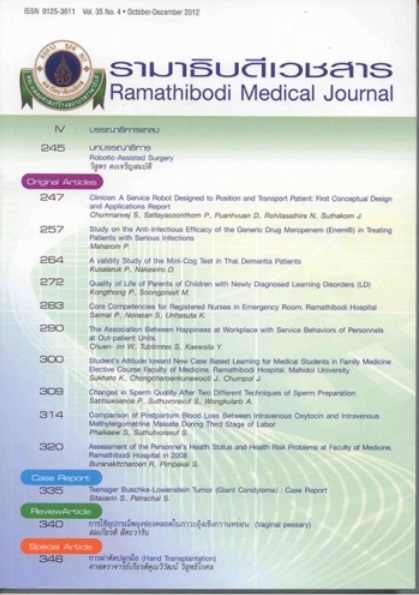Study on the Anti-Infectious Efficacy of the Generic Drug Meropenem (Enem) in Treating Patients with Serious Infections
Keywords:
Meropenem, ENEM, EfficacyAbstract
Introduction: Meropenem, a carbapenem antibiotic, displays a broad spectrum of antibacterial activity against gram positive, gram negative and anaerobe bacteria. It plays an important role in a treatment of multidrug resistant nosocomial infections. However, patients with such indication still have low accessibility to meropenem due to the high cost of the meropenem original drug. Therefore, generic meropenem, such as ENEM, was developed in order to reduce therapeutic cost.
Objectives: The purpose of this study was to evaluate antibacterial efficacy of meropenem in a treatment of severe bacterial infections.
Method: An open-labeled non-randomized matched case-control trial was performed at Somdejprapinklao Hospital. Thirty seven patients diagnosed with severe bacterial infection or high risks in nosocomial infections caused by bacteria sensitive to meropenem volunteered in this study. The clinical and microbiological responses of the treatment group were matched with those of control group with similar clinical manifestations treated by meropenem and other regimens.
Results: Results showed that 15 patients (51.4%) who were treated with ENEM were not found microorganism at the infected sites. And 21 patients (56.8%) who were treated with ENEM were cured based on clinical evaluation. In addition, serum albumin and serum globulin of patients in the treatment group were significantly higher than those of patients in the control group (P = 0.033 and 0.043, respectively). No difference in blood levels of blood urea nitrogen (BUN), creatinine, hepatic enzymes, and electrolytes among patients in the treatment and control groups implied that ENEM caused on serious adverse effects.
Conclusion: This study confirmed antibacterial efficacy and safety of ENEM in a treatment of severe bacterial infections in hospitals.
References
Hurst M, Lamb HM. Meropenem: a review of its use in patients in intensive care. Drugs. 2000;59(3):653-80. doi:10.2165/00003495-200059030-00016.
Lacy CF, Armstrong LL, Goldman MP, Lance LL. Drug Information Handbook. 17th ed. Hudson, OH: Lexi-Comp; 2008.
Zhanel GG, Wiebe R, Dilay L, Thomson K, Rubinstein E, Hoban DJ, et al. Comparative review of the carbapenems. Drugs. 2007;67(7):1027-52. doi:10.2165/00003495-200767070-00006.
Baldwin CM, Lyseng-Williamson KA, Keam SJ. Meropenem: a review of its use in the treatment of serious bacterial infections. Drugs. 2008;68(6):803-38. doi:10.2165/00003495-200868060-00006.
Norrby SR, Gildon KM. Safety profile of meropenem: a review of nearly 5,000 patients treated with meropenem. Scand J Infect Dis. 1999;31(1):3-10.
Linden P. Safety profile of meropenem: an updated review of over 6,000 patients treated with meropenem. Drug Saf. 2007;30(8):657-68. doi:10.2165/00002018-200730080-00002.
Kollef MH. Inadequate antimicrobial treatment: an important determinant of outcome for hospitalized patients. Clin Infect Dis. 2000;31(Suppl 4):S131-8. doi:10.1086/314079.
Ministry of Public Health. Drug Medical Supply Information Center (DMSIC). [Cited 2010 Oct 18]. https://dmsic.moph.go.th/price/prepare.php?data=M&method=drug&name=MEROPENEM VIAL DRY 1 G.
Leelarasamee A, Sathirakul K, Trakulsomboon S, Pongpech P, Naenna P. Bioequivalence study with comparative antibacterial activity of a generic meropenem. J Infect Dis Antimicrob Agents. 2008;25:63-72. https://pdfs.semanticscholar.org/60cb/dc6bd85be4e39e1643dd6627d52c45c33dc3.pdf.
Calandra T, Cohen J; International Sepsis Forum Definition of Infection in the ICU Consensus Conference. The international sepsis forum consensus conference on definitions of infection in the intensive care unit. Crit Care Med. 2005;33(7):1538-48. doi:10.1097/01.CCM.0000168253.91200.83.
Brady CA, Otto CM. Systemic inflammatory response syndrome, sepsis, and multiple organ dysfunction. Vet Clin North Am Small Anim Pract. 2001;31(6):1147-62, v-vi. doi:10.1016/S0195-5616(01)50097-2.













